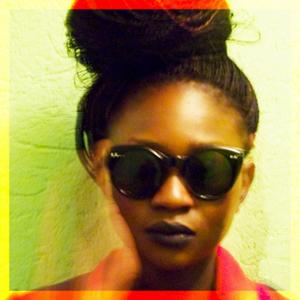Lamin Fofana Africans Are Real
Irreverence outlines the aesthetic of DJ /rupture‘s and Matt Shadetek‘s Dutty Artz label; “lo-fi” animated […]

Irreverence outlines the aesthetic of DJ /rupture‘s and Matt Shadetek‘s Dutty Artz label; “lo-fi” animated GIFs and HTML artifacting recall the heady days of Compuserve and Geocities, while subtle cultural criticism turns meme-worthy with a chuckle. Yet in spite of the Brooklyn-based crew’s penchant for cheeky postmodernism, the Dutty Artz blog reads like the journal of a reluctant zeitgeist. TLC videos and bookclub invitations appear alongside mixtapes, but there’s an underlying sincerity and intelligence at play, and the imprint’s latest release—Lamin Fofana‘s Africans Are Real—typifies these confounding ideals.
Opener “UR” (undoubtedly a nod to Detroit’s seminal Underground Resistance) sets the pace for the EP with arhythmically gated pads and a series of false starts before a dark, head-nodding beat unexpectedly lands square in the face of the mix, accompanied by an erratically filtered lead that gives weight to the hook. Sub-bass and percussive melodics take center stage as the track breathes, but quickly yields to atmospherics and ends as quickly as it began (complete with false cadences).
Fofana teams up with Shadetek for the title track, which begins with a sparing and stiffly quantized beat that’s both familiar and uneven. The space surrounding the lurching drums grows more unsettling as a subtle backing bass drone is joined with a heavily affected synth that meanders around a vague progression. There’s a feeling of late-night Kaossilator jamming in the ether, as if the melody is more of a loose improvisation on a scale than an out-and-out hook, but the forbidding vibe is rich enough to support this detached focal point. As the track rounds out, another sudden shift occurs as its elements rapidly dissolve into noise and space.
Labelmate DJ /rupture furthers this deterioration as he crushes “Africans Are Real” into a gritty wash of distortion, leaving the original tune’s synth line barely recognizable behind a field of noise. The distortion melts away into a haunting experimentation where the voices of disembodied and distant women are found among wind-chime-esque pluckings and increasing melodic tension. Here, too, the track ends without any definitive moment—simply cutting off at random, the next track beginning after the absence of a pause.
Spoek Mathambo and Dutty Artz’s own Chief Boima offer a welcome bit of syncopation to the EP. Mathambo gives us a shuffled and dynamic iteration with pared-down pieces of the original under a punchy garage current. Boima takes on a double-time feel, a synth clave pushing along a bouncing, speed-kwaito tone.
Like demos recorded on a 4-track tape, this release is full of moments of abrupt change and odd, floating placements that convey a sort of organic sensibility. Where many producers would polish, quantize, and otherwise smooth out these anomalies, Fofana makes the compelling choice to not only keep, but celebrate these remnants. Juxtaposing odd timing and atypical structure with some meditated soundscaping, he’s created a release that embodies an attitude celebrated by the label it calls home. At once befuddling and engaging, it is a demanding and interesting listen, yet one that also offers a few glimpses at an emergent greatness.

